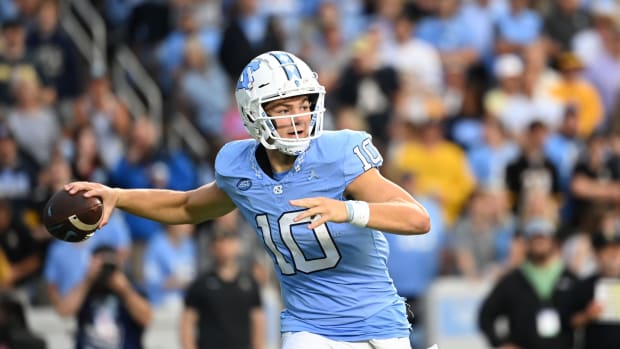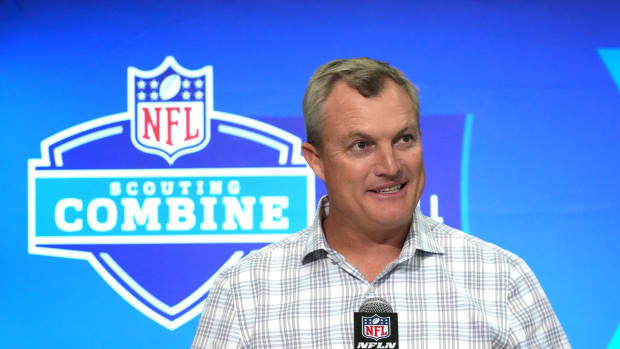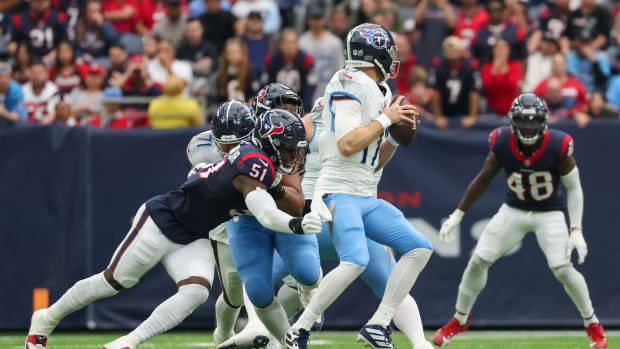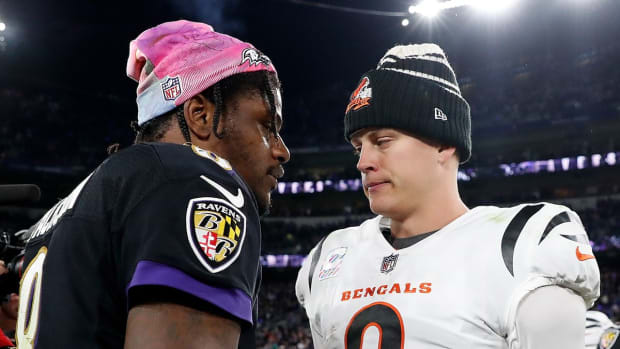The Raiders Move: What’s In It for Las Vegas?
LAS VEGAS — Sunlight streams through the sixth-floor windows of the Clark County Government Center and bounces off 13 metal shovels hanging on commissioner Steve Sisolak’s office walls. Each one commemorates the start of a different construction project, more dirt dug in the desert. One for the clubhouse of the Las Vegas 51s, the Mets’ Triple-A affiliate and the city’s longest-tenured team. Another when ground broke on UFC’s headquarters, a sprawling campus for the world’s fastest-growing sports league. A third for the new practice facility of the NHL’s incoming Golden Knights, the first—and so far only—major professional franchise that Las Vegas has ever called its own.
You have reached your limit of 4 premium articles
Register your email to get 1 more
“Been here 40 years, seen a lot of s---,” Sisolak says. “I’ve seen when this town was little. I’ve seen the university grow. I’ve seen the valley grow by tenfold. It’s been remarkable. If you asked me even 10 years ago, I never thought we’d get a professional team.”
Oh, how fast fortunes out here can swing. In three months the Golden Knights will hold their expansion draft, and their historic regular season-opener is less than 200 days away. And assuming NFL owners approve the Raiders’ relocation at their meetings in Arizona beginning Sunday, Las Vegas will hit the pro-sports daily double.
“I think it makes some people view you as having arrived,” says Sisolak, whose territory includes the stretch of Las Vegas Boulevard known as The Strip. “College games? Come on, there’s a couple hundred colleges across the country. There are not that many professional franchises in any sport. It’s a pretty elite, exclusive club.”
With support from all sides nudging Vegas, entrance into the club seems increasingly likely. According to The MMQB’s Albert Breer, the NFL will sweeten the deal by charging the Raiders a relocation fee of between $325 million and $375 million, as little as half what it cost the Chargers and Rams to move to Los Angeles. At the ownership level, one source told Breer that the Raiders should get “27 or 28 votes” in favor; they only need 24, or three-quarters of the 32 teams.
On the ground in Vegas there’s certainly enough anticipation already. Earlier this month, union workers attended a meeting of the Las Vegas Stadium Authority Board wearing black-and-silver hardhats decorated with the Raiders logo. After all, this is a city known for giving tourists entertainment options that they can’t find at home— the slot machines and residency concerts and Cirque du Soleils for the nearly 43 million visitors the city brings in each year. But an NFL team represents a form of mainstream attraction that resonates with locals as much as the tourist crowd.

A rendering of the airport-area site for the Raiders’ stadium, close to the Strip.
MANICA Architecture
“The Packers and the Brewers and the Bucks were my teams,” says Las Vegas 51s president Don Logan, who hails from Milwaukee. “The people here, my kids who are 25 and 28 who were born here, they don’t have that connection. They have the connection to my teams, just by osmosis at this point. But they don’t have their own loyalties like I do. If the Raiders are here, they’ll be Raiders fans first. I think we have a whole couple generations now that are waiting for their own team.”
Plenty of previoius bids fizzled because Las Vegas lacked adequate stadium space; the city has fielded one too many pitchmen spouting a Field of Dreams ethos—“If you build it, they will come”—only to fail at the actual building part. No longer. The Golden Knights will hold home games at T-Mobile Arena, a $375 million marquee-swathed stadium located next to the New York-New York roller coaster. In October 2016 the Nevada State Legislature created Senate Bill 1, which committed up to $750 million toward an NFL stadium; the city began setting side funds taken from hotel room taxes on March 1. As for the Raiders’ old home? As one NFC executive told Breer, “The bottom line is Oakland has no plan.”
“I just think that Vegas is offering a big chunk of money,” Sisolak says. “I think owners are going to welcome that.”
If the Raiders indeed intend to join the Golden Knights by the fall of 2020, construction on the stadium would need to begin around this time next year, since initial estimates forecast a 30-to-36-month timeline. Located across Interstate 15 from McCarran International Airport on a vacant, dusty plot of land, the proposed site has the all-important backing of Strip owners for a reason: More events in town means increased tourism, which means more business for the house.
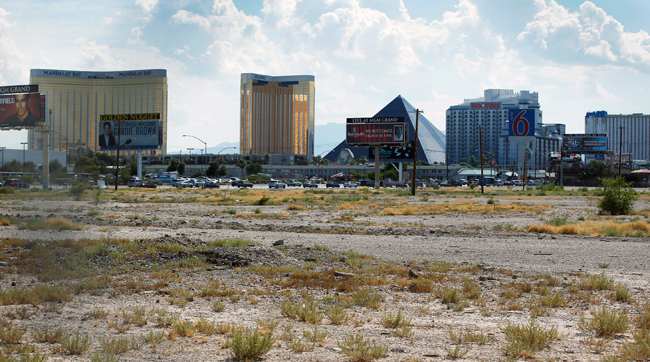
An empty parcel near the action beckons stadium-builders; casino owners won’t mind the proximity.
John Locher/AP
“Where are they going to stay?” says NASCAR driver Kurt Busch, a Las Vegas native who knows full well the answer: any of the area’s 150,000-plus hotel rooms. “Where are they going to gamble? Where are they going to have dinner? The Raiders are going to bring people through that airport.”
Even a representative of Sheldon Adelson, the casino magnate who backed away from contributing $650 million toward the stadium, praises the project: “In our view, the stadium and professional sports in Vegas is a no-brainer. It’s good for the community. It will build community pride. It’s a no-lose situation.”
Worries that Sin City’s vices might threaten the “integrity” of football seem antiquated in today’s daily-fantasy, digital age. But concerns that an already oversaturated entertainment market might struggle to sustain two professional sports teams are legitimate. “I think if the NFL comes, that’s going to be a little more challenging for both teams,” says George Maloof, whose family owns stakes in the Palms Casino and, at a small minority level, the Golden Knights. “There’s only so much corporate you have in this town.” But Maloof also concedes that hockey will most likely be affected. “The Raiders have their fan base, no problem,” he says. “We’re not going to be the first fiddle. Football’s always the first fiddle. That’s just the way it is.”
Some logistics still need resolution. The stadium location, for instance, hasn’t been finalized; while the airport site has generated the most discussion, mayor Carolyn Goodman keeps pushing for the Cashman Field parcel several miles north of the Strip, where the 51s currently play. Eventually the Raiders will submit a lease or operating agreement to the stadium board, though their deadline isn’t until mid-October, and a one-time extension can be granted until April 2018. (And if the Raiders want to come earlier than 2020, UNLV’s Sam Boyd Stadium will need an upgrade.) Outside of 10 NFL and six UNLV football games annually, they’ll need to fill 30 other dates with concerts, soccer friendlies, and whatever else lures visitors into the valley.
• TAKE US BACK TO THE OCHOCINCO DAYS: NFL players on how the celebration rules should change
“That ability to keep that tourism economy carrying forward is extremely important,” says Jeremy Aguero, an analyst whose firm, Applied Analysis, conducted research on behalf of the Stadium Authority. “If you look at the other event centers—Mandalay Bay, T-Mobile Arena, the MGM Grand Garden—if you look at the tickets sold at those locations, 70 to 80 percent are sold to non-resident consumers. There’s no doubt that people are coming to Las Vegas for special events. Being able to leverage that is very important.”
But around here it’s too enticing to look far down the road. The votes seem locked up. Bank of America agreed to replace Adelson’s $650 million, while the Raiders will contribute $550 million; with the city’s $750 million, that accounts for the estimated total $1.9 billion cost of the 65,000-seat dome. A recent midday stroll through the Strip reveals as many Raiders jerseys as any other team, which says something, since it was opening weekend of March Madness and literally everyone was repping some squad. Once the deal gets finalized and a 14th trophy shovel goes up onto Sisolak’s wall?
“Obviously I’m not yet counting on the NFL being there until the NFL’s here,” says Steve Hill, chairman of the Stadium Authority. “But if we’re fortunate enough to add the NFL, that seems to cement the city as one of the sports centers in the United States, or around the world.”
Question or comment? Email us at talkback@themmqb.com.


































